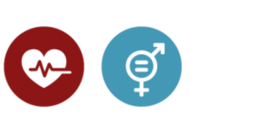Health
-
Battling the coronavirus ‘infodemic’ among social media users in Kenya and Nigeria
As featured in Nature, Faculty Affiliate Susan Athey is investigating low-cost scalable interventions to improve the quality of information circulating online.
March 18, 2024
-
Heart disease risk factors detected in adults in low-income nations
The research serves as a crucial empirical foundation for addressing health disparities and improving outcomes for individuals in the poorest segments of global society.
March 15, 2024
-
Re-evaluating prevalence of risk factors for cardio-vascular disease among people in extreme poverty
A study debunks the belief that cardiovascular diseases are low among the poor; major risk factors have a significant prevalence across all sections, regardless of income.
March 14, 2024
-
A turning point in Nigeria’s fight against cervical cancer
Faculty Affiliate Ami Bhatt has been supporting Nigerian cervical cancer prevention efforts since 2015 alongside global partners and Stanford colleagues and students.
March 13, 2024
-
The prevalence of cardiovascular disease risk factors among adults living in extreme poverty
A study co-authored by Faculty Affiliate Pascal Geldsetzer, featured in Nature, could inform equity discussions for resource allocation and design of effective interventions.
March 13, 2024
-
Could sisal leaves make sanitary napkins more sustainable in India?
A team led by Faculty Affiliate Manu Prakash has found the absorption capacity of a sisal-based material to be higher than those in commercial menstrual pads.
January 08, 2024
-
How to stop turmeric from killing people
The King Center's initiative on lead was featured in The Economist for their research which led to a complete elimination of lead-contaminated turmeric in Bangladesh.
November 02, 2023
-
What do EV batteries have to do with health?
The center's initiative on reducing lead exposure combined epidemiology and management to confront a growing threat from lead-acid batteries in electric vehicles.
October 12, 2023
-
King Center supports undergraduate student research in infectious disease lab
Current and former students share their experience studying mosquito-borne viruses in the lab of Professor A. Desiree LaBeaud.
September 25, 2023
-
Students devote their summer to combating human trafficking in Brazil
King Center undergraduate research assistant Thay Graciano spent her summer in Brazil with faculty members and researchers of the Stanford Human Trafficking Data Lab.
September 18, 2023
-
Stanford researchers investigate human trafficking alongside Brazilian partners in the Amazon rainforest
Members of a King Center initiative investigate possible trafficking sites in Brazil while working to expand an AI database designed to find illegal camps more efficiently.
September 18, 2023
-
Malnutrition early in life sets stage for poor growth and death
A study co-authored by Jade Benjamin-Chung reveals better nutrition during pregnancy and childbearing years is critical to protect children in their first 1,000 days.
September 13, 2023
-
They got the lead out of turmeric!
Affiliated researcher Jenna Forsyth and Faculty Affiliate Stephen Luby worked with the Bangladesh Food Safety Authority to eliminate lead-contaminated turmeric in the country.
September 13, 2023
-
Stanford research exposes toxic lead used to enhance color of turmeric
A King Center-supported initiative successfully reduced lead adulteration in turmeric in Bangladesh from 47% to 0% in two years.
September 13, 2023
-
Q&A with King Center Predoctoral Fellow Ei Thandar Myint
Former predoctoral fellow Myint discusses her research with King Center faculty affiliates and her overall experience as part of the inaugural cohort in the program.
September 05, 2023
-
Growing solutions to childhood stunting
King Center undergraduate research assistant Claire Morton and Faculty Affiliate David Lobell investigated how adding minerals to farmland soil affects children's health.
August 30, 2023
-
Benefits of electric stoves on health and environment in Ecuador
Faculty Affiliate Marshall Burke and former Postdoctoral Fellow Brandon de la Cuesta studied the impacts of a program in Ecuador that put induction stoves in 750,000 households.
August 15, 2023
-
Experts discuss how environmental changes are altering the risk for mosquito-borne diseases
In Stanford News, Faculty Affiliates Erin Mordecai and Desiree LaBeaud discuss what we know and how communities can protect themselves from these changing disease threats.
August 08, 2023
-
Tuberculosis in prisons poses broader problems
Faculty Affiliate Jason Andrews, who has been researching tuberculosis in Brazilian prisons, discusses why treating TB in prison is critical to combatting the disease worldwide.
July 20, 2023
-
The vice of spice: Confronting lead-tainted turmeric
A King Center-supported initiative focused on reducing lead exposure was featured in Undark for their research in Bangladesh, which resulted in government intervention.
July 19, 2023





